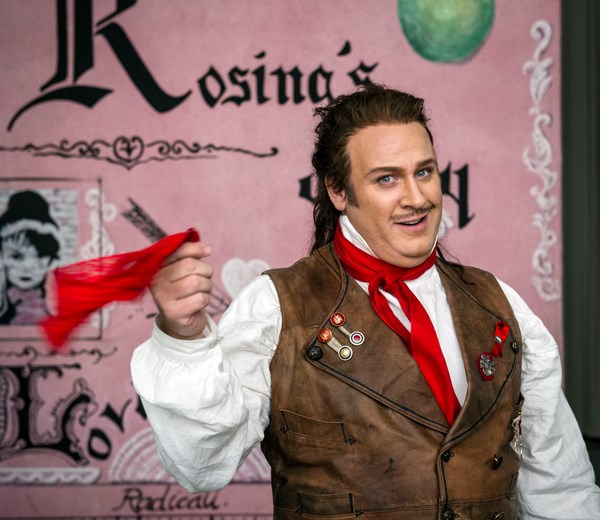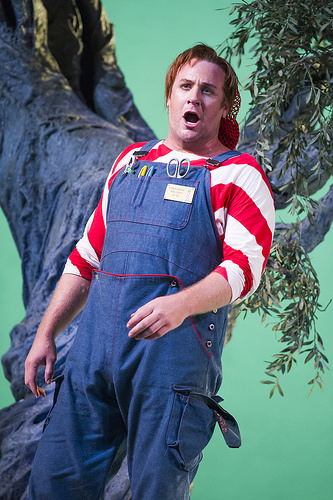
After 12 productions and 57 performances, I’ve come to learn a lot about Figaro, Figaro, Figaro. And yes, we’ve all seen the Bugs Bunny cartoon.
Largo al factotum
Boom! Singing Figaro is like getting shot out of a cannon! It starts out with the most challenging—and most recognizable—aria for baritones in the repertoire.
Five sustained high G’s, two optional high A’s, a high tessitura, and lightning-fast patter. So, you have to come out guns a-blazing, if you know what I mean.
Okay, if you don’t know, that means you need to be fully warmed up before entering the stage. No worries, though: after the aria, it’s a slow burn until the end. There’s enough time to vocally recuperate between the large musical sections but man, that first aria is harder than being a one-legged man in an ass-kicking competition!
Apart from the the short-lived (but brutal!) vocal challenges at the beginning, I’d say the true trick to becoming Figaro is the comedic timing.

Figaro is Funny!
Rossini makes every Barber good but it’s up to the performer himself to make this role great. It’s more than just the music, the high notes, and the show-stopping tunes. It’s even more than the laughs you get from what’s written on the page—it’s the moments that are created from reacting in real time.
The comic timing of Figaro has to be dead on. That’s the ultimate trick.
So how does one master comedic timing? It’s all about listening and paying attention to what’s happening around you. An organized approach to Figaro makes him and the story more believable and enjoyable. If someone steps on my toe, I literally yell out, “ow!” or if something makes me laugh, I will actually laugh. It’s my favorite part of Figaro: just being natural.
Physically speaking, do less. Keep it Spanish, classy, and suave—not too buffo. The comedy lies in the natural reactions happening in real time. For me, if I roll with the punches, the night is a success!

For example, one time, I was performing with Isabel Leonard. Her wig was a little out of place, so I thought, “I’m her Barber. I’m going to fix her hair.” So I took this piece of hair that had fallen onto her ear and as I tried to fix it, she pushed me away (to go along with what she was saying in that moment). I tried a second time and she pushed me away again! I finally quickly fixed it at the end of the scene and the audiences cracked up because it was such a genuine moment that I was a Barber at all times.

Another good example of rolling with the punches is That Time When… I Met Stephen Fry Mid-Aria at the Royal Opera House.
Or when I was performing in 90-degree weather in an outdoor theatre and proceeded to remove my jacket and vest after my aria because it was so hot. The audience was fanning themselves like a Baptist church on a Summer Sunday in Mississippi, and it was painfully obvious that I was sweating and that all of the singers were struggling with the heat. When I brought that little bit of reality into the show, the audience ate it up!
Another aspect to portraying Figaro is to not make things too easy for him: each obstacle needs to be treated like a true challenge. His process of reaching a solution has to seem like somewhat of an effort so the audience can linger in that realm of “oh no, what’s gonna happen?”
Most importantly, if you’re not having a good time portraying Figaro, the audience isn’t going to either. You should get done with each scene and think, “man, this is fun!”
Everyone Could Use a Little Figaro
Having performed Figaro in so many productions, I’ve had the chance to explore the character from many different angles. As a result, I have a wide-range of character options to choose from in my arsenal, and I like to have a little bit of each production’s Figaro in me when I perform.
Even today, I’m still open to new interpretations of Figaro, but what I’ve locked down is that Figaro is a man about town who has a knack for helping people out. And he’s so good at it that he realizes he should be paid for it.
How, you ask? Figaro is slick. He reads situations, but most of all… he reads people.
He solves any and all problems at a moment’s notice, and usually the answer was right under your nose all along. He’s like a savant chef who shows up at your house and uses ingredients from your kitchen to create a world-class meal that you couldn’t have even imagined on your own. He takes what’s in your life, you tell him what you want to accomplish, and he makes that vision a reality.
The barber helps make you your best self: he’ll fix your hair, make you smell good, find you a date, air your grievances, suck your blood out with leeches, and so much more.
People are his business. And he takes care of them.
Don’t we all need a Figaro?
All That Motivates Is Gold
So what motivates Figaro to go around providing favors for everyone? An important scene from the opera reveals that money is Figaro’s motivation, since he won’t help the Count rescue Rosina until he gets paid. Yet, I believe he would continue his line of work without getting paid because he loves it so much and he has a good heart. Even though he sings, “All’ idea di quel metallo,” the idea of helping people out and being useful really gets him going.
And plus, everyone owes him a favor in town, so he always has the upper hand. He’s like a mafia don without the clack.

My First Figaro
Fourteen years ago, I learned Figaro while at the Merola Opera Program in San Francisco. Martin Katz, the conductor for the show, was a huge help for me with all of his ideas of ornamentation. He actually gave me an ornament overload, and not all of them stuck with me, but he showed me the scope of the bel canto style which propelled me to create my own signature Figaro.
On the subject of bel canto, it’s honestly hard for me to think of “beautiful singing” in this role, though it absolutely embraces the other components of bel canto such as coloratura, expression, and ornaments.
One important thing to note for baritones specifically: I have never had success singing this for an audition piece even though I sing it well.
Think about it. If you start with it, then you’re definitely going to have to sing Pierrot’s Tanzlied or “O, du mein holder abendstern” after it no matter what and that, my friends is hard to do. If the company is casting for Barber then knock yourself out and sing it. But for me, it was better to leave off my package entirely. It’s like singing the Habanera: Everyone has their own opinions of what you should be doing because it’s that famous of a piece. Without the context of the entire role, it can be a tricky sell, so don’t be afraid to leave it off your list even if you sing the crap out of it!
If you do want to keep it on your list, and want some inspiration here’s a list of some Barbers that I admire:
1. Hermann Prey
2. Sherrill Milnes
3. Thomas Hampson
4. Peter Mattei
5. Tito Gobbi
And here’s me doing Largo in performance with a live audience!
[youtube https://www.youtube.com/watch?v=bfA_NGVJiUI]
So why do I keep singing the role year after year? Because it never gets boring! And what has Figaro taught me after 14 years? Well, whenever I’m dealing with any problem in my life… there’s more than one way to skin a cat!
What do you think? Did you find this article interesting, entertaining, or helpful? Feel free to chime in with a comment below.

Giant Lucas thank you for this man . Really love this blog. Hugs from Uruguay .
Thank you, Lucas.